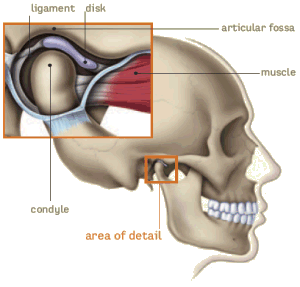Everybody's Got A Case of TMJ, TMD
|
||||||||||||||
| Printer Friendly Story View |

The Anatomy of TMJ
You have TMJ? Maybe TMD?
In fact, everyone does. TMJ isn't a problem it's a joint. The temporomandibular joint (TMJ) is situated just in front of the ear. It consists of the temporal bone (side and base of the skull) and the lower jaw. Chewing muscles connect the temporal bone to the lower jaw allowing you to move your jaw up and down, and from side to side. When working properly both the joint on the right and left side are synchronized during movement.
Normal function for this joint and muscle group includes chewing, swallowing and speech, however, certain tasks can aggravate the joint, causing discomfort more commonly referred to as temporomandibular joint disorder (TMD). TMD is caused from overuse of the muscles, specifically from clenching or grinding teeth. These excessive habits tire the jaw muscles and can lead to chronic facial or neck pain. Also, abnormal function of the joint can lead to worn or sensitive teeth, traumatized soft tissues, muscle soreness, jaw discomfort when eating and temporal headaches.
Symptoms that you might experience include but are not limited to:
Treating TMD varies depending on the severity of the case. The majority of cases can be treated by allowing the joint to time to rest, taking a non-aspirin pain reliever and practicing relaxation techniques, as well as eating soft foods and avoiding chewing gum. More severe cases may be treated with physical therapy, ice and hot packs, posture training and orthopedic appliance therapy.
TMD is a condition that is often cyclical and may recur during times of stress. As a patient, you should be active in your treatment by being aware of the causes of your jaw problems after seeing your dental professional for a diagnosis and regime. For more information log on to http://www.ada.org/public/topics/tmd_tmj.asp
| Printer Friendly Story View |

|
Prior Article
March 5, 2025 by: Stephen Kent St. Patricks Parade 2025 - IT's TIME |

|
Next Article
February 10, 2020 by: Rachel Reh Family Winter Fun Fest is BACC Hot Spot for 2/10/2020 |
|
|

Ken Nelson, DDS, Dentistry |
|
|
|
Printer-Friendly Story View
0200 Nd: 04-28-2025 d 4 cpr 0
12/31/2020 P3v3-0200-Ad.cfm
SPONSORED LINKS
12/31/2020 drop ads P3v3-0200-Ad.cfm
